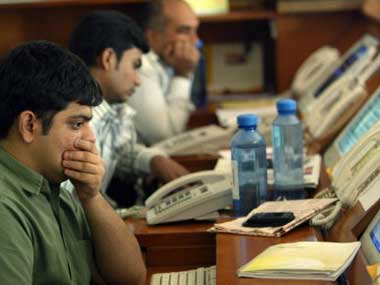By Rajesh Pandathil and Sunainaa Chadha
For those who rejoiced after a marginal pull back in the rupee, here’s a reality check: extreme volatility is back to haunt the markets, with the rupee plunging below 67 again and shares falling 400 points.
Investors fear that in the absence of any concrete action from the government on the policy front, a rising oil subsidy burden will further weaken the government finances and result in a sovereign downgrade.
In fact India is at the centre of a global turmoilin which FIIs are exiting emerging markets as safer US market is seen recovering from its slowdown.
For the week ended 28 August, 2013, India alone saw $609 million of net selling, while Taiwan, the Philippines and Thailand all saw over $300 million of net selling.
[caption id=“attachment_1081363” align=“alignleft” width=“380”]
 AFP[/caption]
AFP[/caption]
The fact that there are experts who believe the worst may be over for emerging markets only accentuates India’s predicament.
This morning rating agency S&P said chances of a sovereign downgrade for India are higher than that of Indonesia, the other country which witnessed a massive foreign institutional sell-off along with India.
Goldman Sachs today joined a host of foreign brokerages to cut India’s GDP forecast to 4 percent from 6 percent earlier.
“We are cutting our growth forecasts for India and most of southeast Asia. The largest downward revisions are in India, followed by Indonesia, Thailand and Malaysia,” the global investment banking giant said in a report.
Echoing the views, Nomura said the worst is over for Asian emerging markets but it cautioned that individual countries may continue to suffer.
Steve Ashley, London-based head of global markets at Nomura, in an interview with Bloomberg , said “We’re through the worst of the crisis but it doesn’t mean individual countries won’t continue to suffer significant challenges.”
If India is struggling even as other countries get out out of the mess, the blame squarely rests on the government
A strategy report by Kotak Equity Institutional points out the government’s populist measures and its business as usual mindsetwill only worsen the situation.
" We believe that the recent measures implemented by the RBI and the Government tackle the symptoms rather than the underlying problems of CAD, gross fiscal deficit and weak investment. Not surprisingly, they have proved inefficacious. We have repeatedly argued for more effective measures (both short-term and long-term) that can address India’s basic problems of twin deficits and weak investment cycle. Despite the ongoing economic crisis, the Government has focused its energies on implementing certain populist legislations," saidKotak analysts Sanjeev Prasad, Akhilesh Tilotia and Sunita Baldawa in the report.
Why Indian equities are not a buy despite cheap valuations
The report further adds that Indian equities are far from a screaming buy despite inexpensive valuations.
“Valuations look inexpensive on paper but not so when viewed in the context of corporate governance, valuations of good stocks, weak earnings growth and deteriorating financial returns. The Government’s preoccupation with the next general elections and politics precludes any strong reform measures over the next few months.”
Kotak has a solution for the government. “It would make sense for the Indian Government to cut subsidies on oil and use the funds to finance investment in basic infrastructure given that the private sector has hardly any capacity to invest currently,” said the report.
However, with elections looming, the government’s populist measures ( passage of Food and Land Bill) will but make spending cuts easy. The ball is in the government’s court or India could soon become the worst effected emerging market.
““Solutions do exist but the track record of India’s policymakers has been quite patchy to inspire confidence,” said Kotak analysts.
)